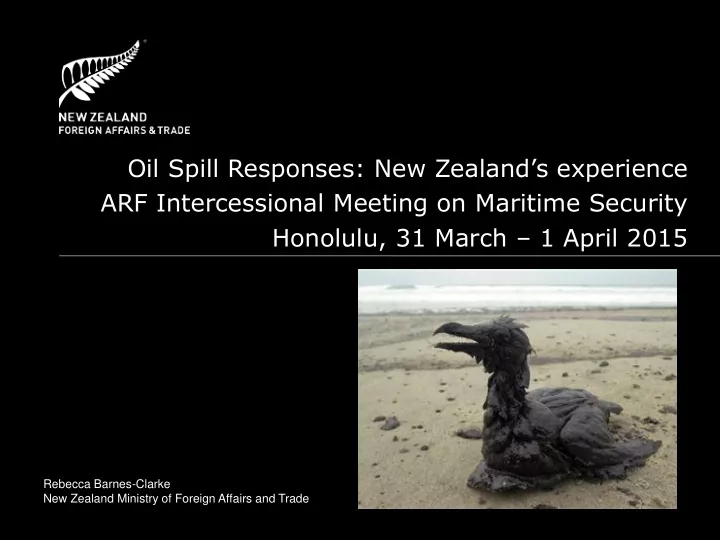

Oil Spill Responses: New Zealand’s experience ARF Intercessional Meeting on Maritime Security Honolulu, 31 March – 1 April 2015 Rebecca Barnes-Clarke New Zealand Ministry of Foreign Affairs and Trade
Since 1990 • 1998 Don Wong 529 – Stewart Island (with 400 tonnes of automotive gas oil spilled) • 1999 Rotoma – Poor Knights Island (oily bilge discharge of approx 7 tonnes spilled) • 2000 Sea Fresh – Chatham Islands (60 tonnes of diesel spilled) • 2002 Jody F Millennium – Gisborne (25 tonnes of fuel oil spilled) • 2002 Tai Ping – Bluff (no oil spilled) • 2011 Rena – Tauranga (approx 350 tonnes of heavy fuel oil spilled)
New Zealand’s Strategy • A strategy is required under the Maritime NZ under the Maritime Transport Act 1994. • New Zealand Marine Oil Spill Response Strategy 2015-2019 • Information about how New Zealand responds to oil spills but also sets the vision, principles, goals and objectives for New Zealand’s marine oil spill readiness and response.
Responses • New Zealand has a three tier approach : – Tier One Oil Spills – responded to and resolved by the operator – Tier Two Oil Spills – response led and resolved by the local regional council – Tier Three Oil Spills – complex, longer duration and impact and beyond the response capability of either Tier One or Tier Two, response is nationally led and coordinated by Maritime New Zealand
A Tier Three Response • National On Scene Commander – appointed (Five NOSCs available across NZ). NOSCs run the oil response and have their own legislative powers. • Emergency Coordination Centre – established in a place where NOSC deems most appropriate. • Maritime NZ has responsibility for the response activity and regulatory oversight
Most recent experience: Rena • 2011 – Rena off the coast of Tauranga, New Zealand • Maritime NZ Capability Plan that will flow on from the Strategy will incorporate and advance initiatives under way in the wake of the Rena incident and the upturn in offshore gas and oil activities
Lessons learnt • The oil response went well – establishing National On Scene Commander and Emergency Coordination centre. • Better coordination required within government and with some stakeholders – including Māori (NZ indigenous population) • Strategy provides a wider framework for the non-oil aspects of spills, e.g. beads
Recommend
More recommend